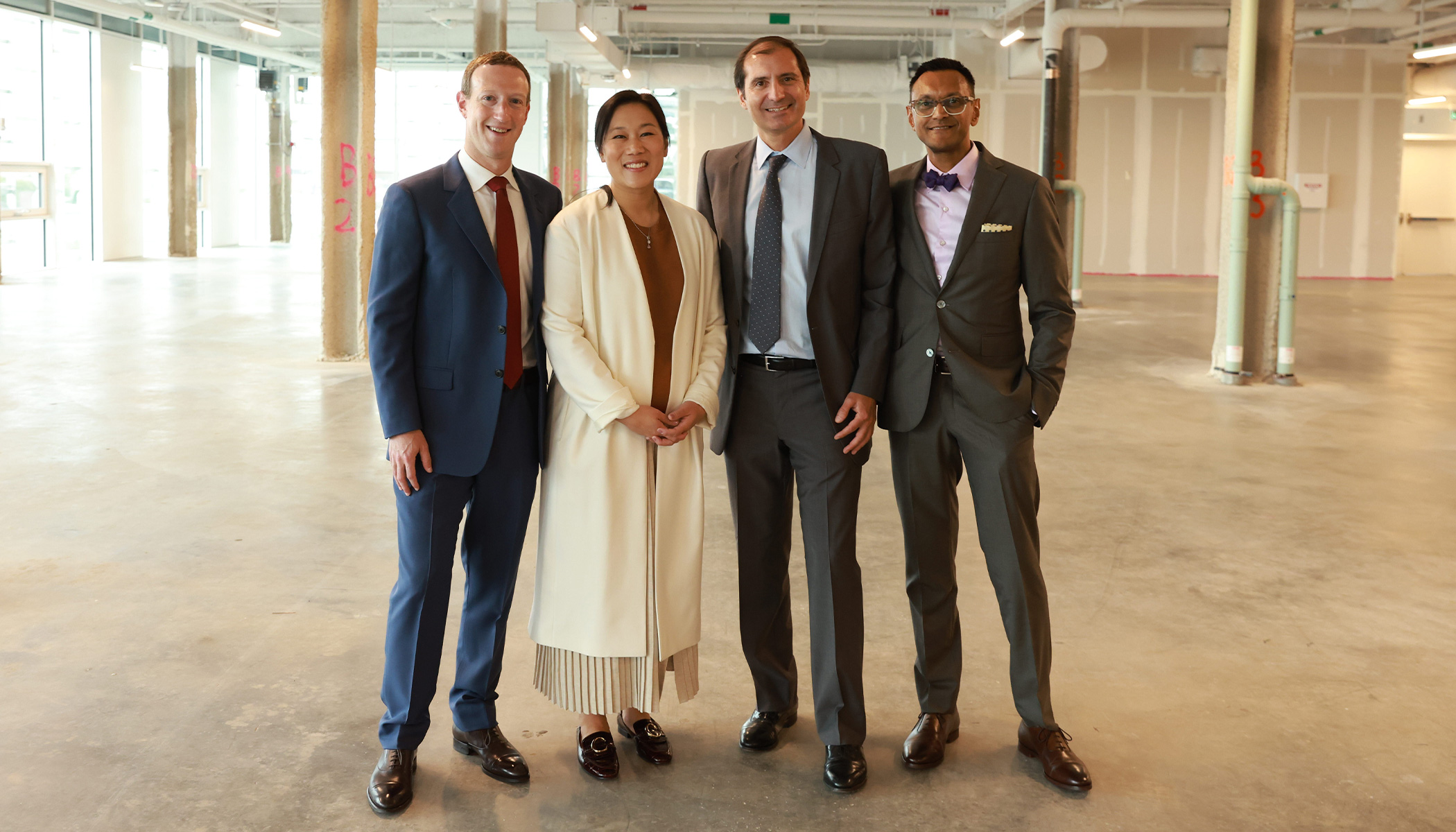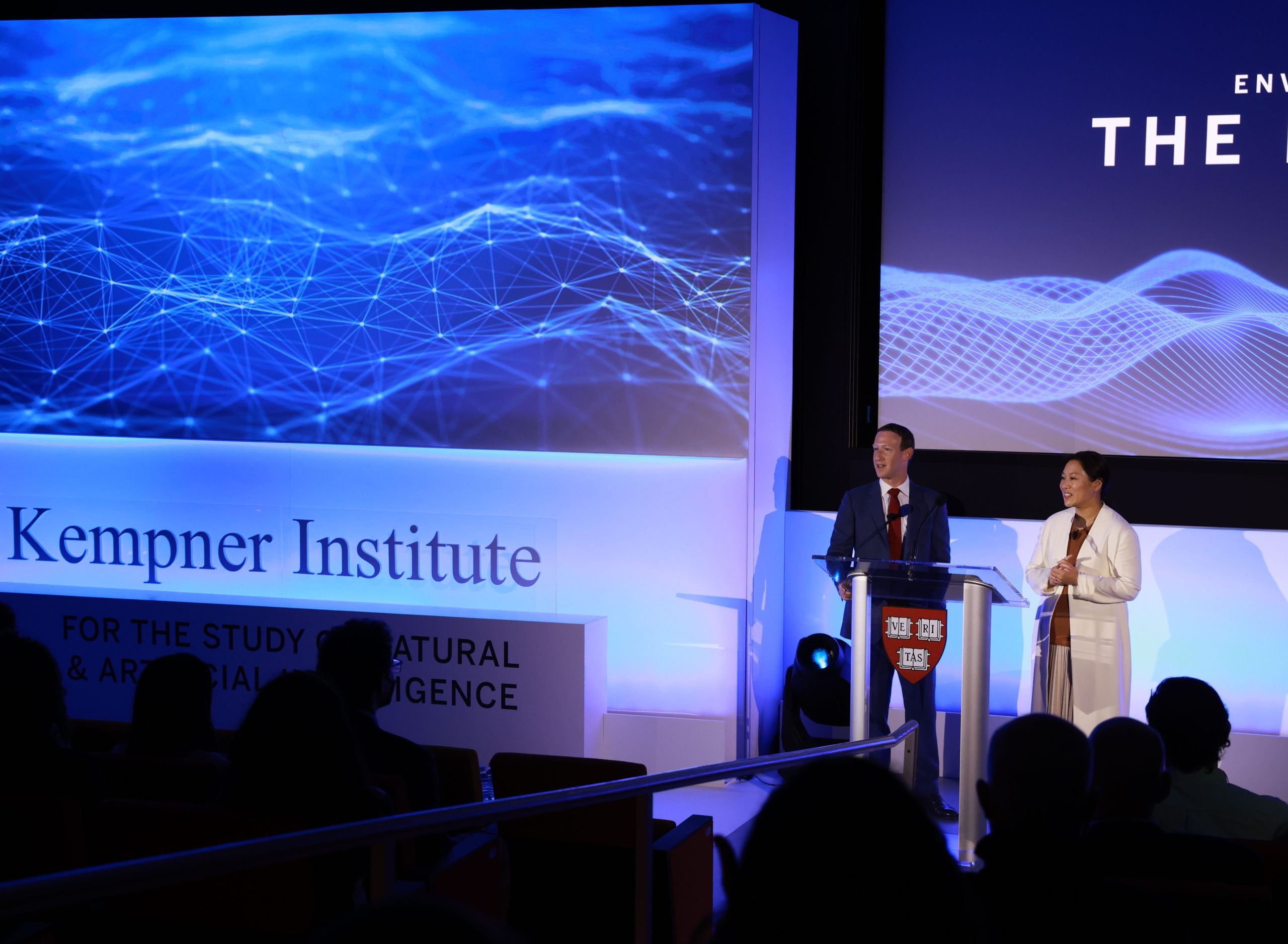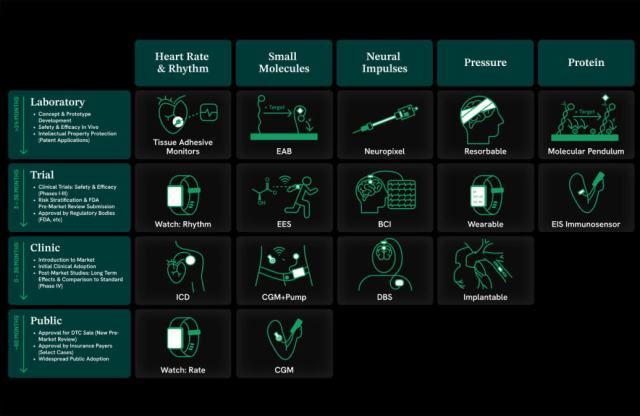Sep 23, 2022 · 6 min read
Science, Tech, and AI Leaders Convene to Launch Kempner Institute
CZI Co-Founders and Co-CEOs Mark Zuckerberg and Priscilla Chan and President of Harvard University Lawrence Bacow commemorate new research institute to study natural and artificial intelligence

On Thursday, leadership from the Chan Zuckerberg Initiative (CZI) and Harvard University celebrated the launch of the Kempner Institute for the Study of Natural and Artificial Intelligence at Harvard University with a symposium on Harvard’s campus. Speakers included CZI Head of Science Stephen Quake, President of Harvard University Lawrence Bacow, Provost of Harvard University Alan Garber, and Kempner Institute co-directors Bernardo Sabatini and Sham Kakade. The event also included remarks and panels from industry leaders in science, technology, and artificial intelligence, including Bill Gates, Eric Schmidt, Andy Jassy, Daniel Huttenlocher, Sam Altman, Joelle Pineau, Sangeeta Bhatia, and Yann LeCun, among many others.
The Kempner Institute will seek to better understand the basis of intelligence in natural and artificial systems. Its bold premise is that the two fields are intimately interconnected; the next generation of AI will require the same principles that our brains use for fast, flexible natural reasoning, and understanding how our brains compute and reason requires theories developed for AI. The Kempner Institute will study AI systems, including artificial neural networks, to develop both principled theories and a practical understanding of how these systems operate and learn. It will also focus on research topics such as learning and memory, perception and sensation, brain function, and metaplasticity. The Institute will recruit and train future generations of researchers from undergraduates and graduate students to post-docs and faculty — actively recruiting from underrepresented groups at every stage of the pipeline — to study intelligence from biological, cognitive, engineering, and computational perspectives.
CZI Co-Founder and Co-CEO Mark Zuckerberg said: “The Kempner Institute will be a one-of-a-kind institute for studying intelligence and hopefully one that helps us discover what intelligent systems really are, how they work, how they break and how to repair them. There’s a lot of exciting implications because once you understand how something is supposed to work and how to repair it once it breaks, you can apply that to the broader mission the Chan Zuckerberg Initiative has to empower scientists to help cure, prevent or manage all diseases.”
CZI Co-Founder and Co-CEO Priscilla Chan said: “Just attending this school meant the world to me. But to stand on this stage and to be able to give something back is truly a dream come true … All of this progress starts with building one fundamental thing: a Kempner community that’s diverse, multi-disciplinary and multi-generational, because incredible ideas can come from anyone. If you bring together people from all different disciplines to look at a problem and give them permission to articulate their perspective, you might start seeing insights or solutions in a whole different light. And those new perspectives lead to new insights and discoveries and generate new questions that can lead an entire field to blossom. So often, that momentum is what breaks the dam and tears down old orthodoxies, unleashing new floods of new ideas that allow us to progress together as a society.”
CZI Head of Science Stephen Quake said: “It’s an honor to partner with Harvard in building this extraordinary new resource for students and science. This is a once-in-a-generation moment for life sciences and medicine. We are living in such an extraordinary and exciting time for science. Many breakthrough discoveries are going to happen not only broadly but right here on this campus and at this institute.”
CZI’s 10-year vision is to advance research and develop technologies to observe, measure, and analyze any biological process within the human body — across spatial scales and in real time. CZI’s goal is to accelerate scientific progress by funding scientific research to advance entire fields; working closely with scientists and engineers at partner institutions like the Chan Zuckerberg Biohub and Chan Zuckerberg Institute for Advanced Biological Imaging to do the research that can’t be done in conventional environments; and building and democratizing next-generation software and hardware tools to drive biological insights and generate more accurate and biologically important sources of data.

President of Harvard University Lawrence Bacow said: “Here we are with this incredible opportunity that Priscilla Chan and Mark Zuckerberg have given us to imagine taking what we know about the brain, neuroscience and how to model intelligence and putting them together in ways that can inform both, and can truly advance our understanding of intelligence from multiple perspectives.”
Kempner Institute Co-Director and Gordon McKay Professor of Computer Science and of Statistics at the Harvard John A. Paulson School of Engineering and Applied Sciences Sham Kakade said: “Now we begin assembling a world-leading research and educational program at Harvard that collectively tries to understand the fundamental mechanisms of intelligence and seeks to apply these new technologies for the benefit of humanity … We hope to create a vibrant environment for all of us to engage in broader research questions … We want to train the next generation of leaders because those leaders will go on to do the next set of great things.”
Kempner Institute Co-Director and the Alice and Rodman W. Moorhead III Professor of Neurobiology at Harvard Medical School Bernardo Sabatini said: “We’re blending research, education and computation to nurture, raise up and enable any scientist who is interested in unraveling the mysteries of the brain. This field is a nascent and interdisciplinary one, so we’re going to have to teach neuroscience to computational biologists, who are going to have to teach machine learning to cognitive scientists and math to biologists. We’re going to do whatever is necessary to help each individual thrive and push the field forward … Success means we develop mathematical theories that explain how our brains compute and learn, and these theories should be specific enough to be testable and useful enough to start to explain diseases like schizophrenia, dyslexia or autism.”
###
About the Chan Zuckerberg Initiative
The Chan Zuckerberg Initiative was founded in 2015 to help solve some of society’s toughest challenges — from eradicating disease and improving education, to addressing the needs of our communities. Through collaboration, providing resources and building technology, our mission is to help build a more inclusive, just and healthy future for everyone. For more information, please visit chanzuckerberg.com.





